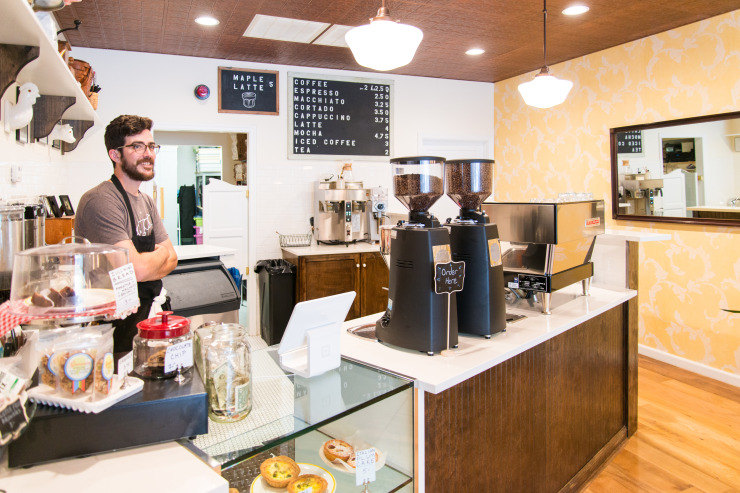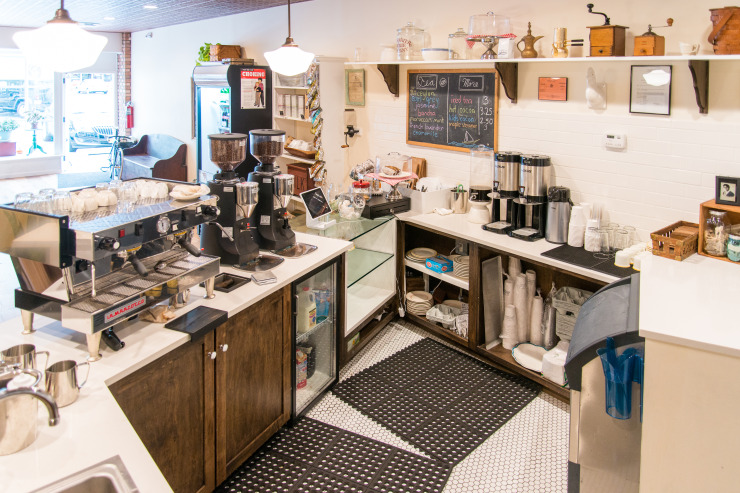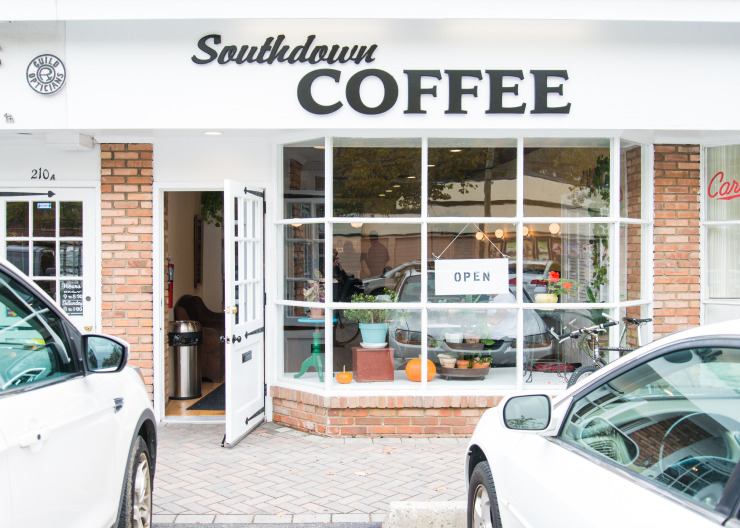
The third wave of coffee has fully broken on America’s shores, saturating most major metropolitan areas, and the tide is still coming in. All sorts of cutting-edge coffee experiences are finding their way onto Main Streets across the country. One of the big drivers of this trend is young, passionate people returning to their homes after sojourns in a big city. For example, at Southdown Coffee, about an hour outside of New York City in Long Island, Mark Boccard is channeling his experience in coffee cities large and small into a local vision of big-city style coffee. Located in a small shopping center toward the edge of Huntington’s retail district, the shop opened in September, and is starting to gain momentum as it tries to convince Long Islanders that tasty coffee isn’t just something they have when they’re in the city.
Originally from Huntington, Boccard started down the coffee road in Seattle, cutting his teeth at Caffe Vita. He bounced around to Oakland, CA and Portland, ME, eventually landing in Brooklyn. There, he worked at Smith Canteen where he honed his barista and management experience. Eventually he worked as a production assistant for Joe in the Pulley Collective space after the company began roasting.
While living in Brooklyn, he got the inside scoop on a space back home. His family already owned the property, and the leaseholder was leaving without plans to renew. He jumped at the chance to set up shop in a part of Huntington with very little retail turnover, but he knew the trick would be making the space the right fit. Boccard admitted that he had concerns his time away from home would render his efforts brushed off as “just some Brooklyn place.” A fair worry, especially when his coffee is being roasted at the Pulley Collective shared roasting facility in Brooklyn.
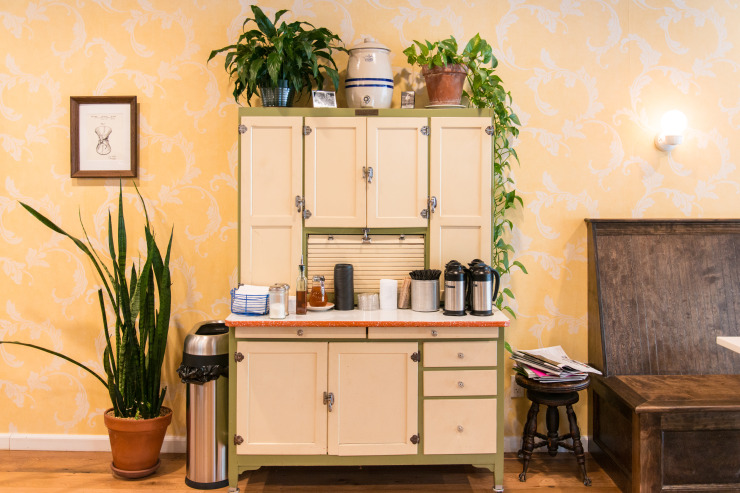
Fancy third wave micro-roasting arrangement aside, the actual Southdown retail space is not what someone might expect from a third wave shop starting from a blank slate. From the outside, the cafe blends in with the other storefronts seamlessly. The signage eschews heavily contemporary design and instead exists as an homage to the previous tenant, Southdown Travel (“Southdown” refers to the part of Huntington where the cafe resides). Through the space’s original small-paned windows, you see antiques and plants amidst a cozy, handsomely straightforward shop.
The design is much less industrial than current trends back in the city. The seating is comprised of two pew-like benches (one large, one small) and five small tables available for laptop workers or morning paper readers.
Boccard’s ties to the area are on display subtly in the cafe, in family photos and old pictures of the property. Otherwise the space is sparsely decorated, with some old grinders and brewers on display and an antique chifferobe for storage. Old and new are pleasantly blended here, another intuitive nod to the neighborhood.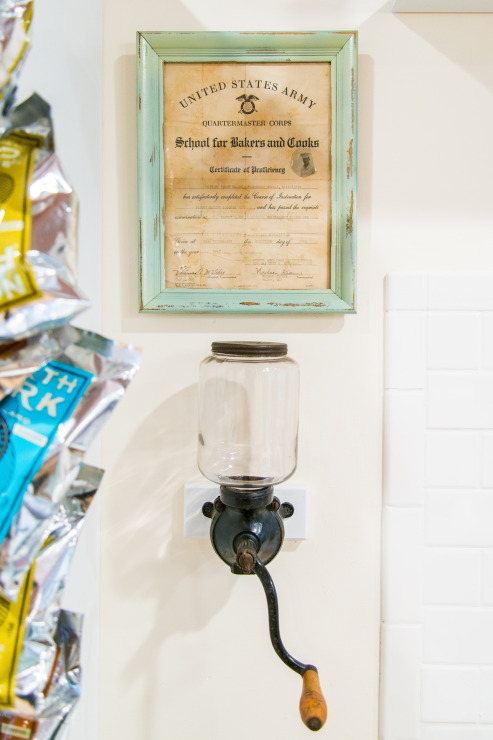
Toward the back of the shop, a small office and additional coffee storage lead to a full kitchen where small plates are prepared—modern, inventive sandwiches during the week and hot egg options on the weekends. In addition to the in-house offerings, Boccard stocks other local goods like rolls, jelly donuts, and crumb cakes from Reinwald’s Bakery, a half-century-old Long Island institution.
While the cafe itself is a partial departure from its urban brethren, the coffee offerings are ambitious for a population raised on mass-produced blends. Boccard only brews single origin coffees on Fetco drip, espresso, and cold brew. But he tries to incorporate coffees that makes sense for the locals. During our visit, we tasted the last of a Colombia Finca Potosi that had the gentle balance of a blended cup. He’s excited to currently offer beans from Pulley Collective owner Steve Mierisch’s farm Mama Mina, which Boccard describes as having a “dynamic taste with plenty of sweetness, a juicy body, and a mild citrus acidity that really pops.”
As a specialty evangelist among the Long Islanders, Boccard still has a long way to go. When customers come in asking for “flavored coffee”, he tries to explain what he offers. He says he’s looking to educate them rather than force specialty coffee on them, though Boccard does mention that he is “uncompromising” with the roasts he selects, offering what he wants to present to the public, not necessarily what the public might be expecting.
While Huntington is a fairly cosmopolitan town, the area is in many ways a very working-class, middle of the road sort of place, fond of the utilitarian roots of coffee in the U.S. But Boccard appreciates this: “I think it’s fun to have a shop that appeals to people looking to get a quick cup of coffee and get back in the car at 6AM, and people who are into specialty coffee and want to talk about roast profiles and pour-overs. Those people are all out here—I’ve been amazed at how many long islanders use a Chemex at home—and I think we offer a concise product that can be enjoyed from many angles.”
Southdown Coffee is located at 210b Wall St, Huntington, NY 11743.
D. Robert Wolcheck is a Sprudge contributor based in New York City. Read more D. Robert Wolcheck on Sprudge.


